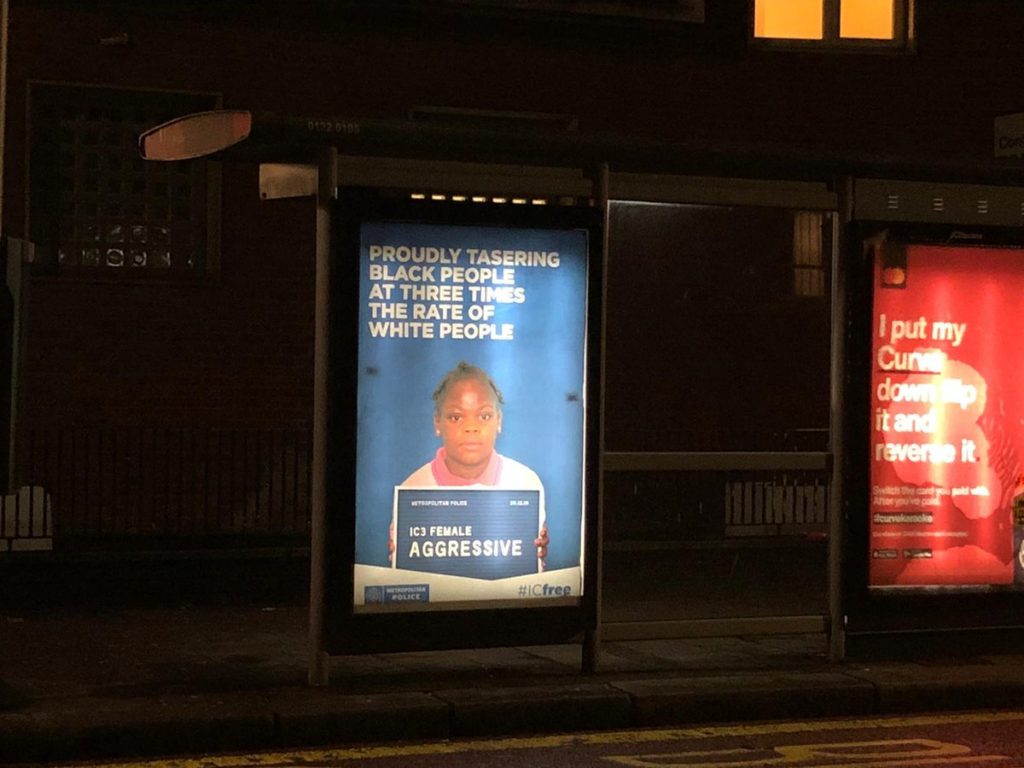


ICFREE are aiming to end of criminalisation of Black & Brown Youth in the Criminal Justice System & the Education System! #ICFREE# ICFreeNotIC3



ICFREE are aiming to end of criminalisation of Black & Brown Youth in the Criminal Justice System & the Education System! #ICFREE# ICFreeNotIC3
Pastor David Lynn. Street preaching in Toronto. Arrested for preaching the Gospel of Jesus Christ. Assaulted numerous times.. Bullied.. Bashed for His faith. Arrested for preaching on a PUBLIC SIDEWALK.
As the sounds of “tolerance” and “inclusion” continue to ring up and down the streets of America, it seems those principles fail to apply when it comes to Christians expressing their religious beliefs.
David Lynn, a pastor for Christ Forgiveness Ministries in Toronto, was handcuffed and arrested on June 4th for preaching the Good News of Jesus Christ on the streets of an LGBTQ-friendly community. “Everybody can have dignity and respect, everybody, but do you know it’s not all the time that this is carried out,” Lynn announced on the street corner, before ‘coming out of the closet’ as a Christ follower.
The pastor proceeded to ask if individuals within close proximity would tolerate him, as one person after another turned their backs and shut him down.
“What about acceptance? What about acceptance?” asked one irritated listener who got in Lynn’s face.

“Jesus died for the sinner,” Lynn told them. “Every heterosexual has sin. Every homosexual has sin. Sin is when we violate the laws of God.”
As he continued to peacefully proclaim God’s love for all with a message about sin that was inclusive of both the heterosexual and homosexual community, various people attempted to trip and push the preacher.
Though Lynn remained calm and asked that people assaulting him would take their hands off of him, he was the one approached by police who accused him of being a “disturbance” and “breaching the peace.”
Though the pastor uses amplification to preach outside weekly, officers told him he needed to preach without amplification.
Lynn cooperated and continued preaching with no microphone in hand, but he was still ultimately arrested.
One of the arresting officers said that the pastor was arrested for breaching the peace though he admittedly didn’t know what those comments were. As Lynn was handcuffed and put in the police car, he repeated, “I was sharing the Gospel.”
“God loves you. There is hope for you,” he added, reiterating his earlier message. “Whatever community you are, God loves you. Jesus died for you.”
“Our religious beliefs and our freedoms to exercise that belief are going to be taken away,” said one of the Christians accompanying Lynn, following the pastor’s arrest. “We didn’t form a mob today. A mob was formed against us. Assault was demonstrated against us. We were assaulted. No one who assaulted us was arrested, but the person that was speaking and freely exercising their Christian beliefs was handcuffed, and we don’t even know where he’s at right now.”
In a statement released that day, Pastor Lynn said,
“Every community in Toronto should have the same laws, and everyone should be welcome. Everyone should have rights, dignity, and respect, just like Christians should as well.”
Pastor Lynn
A nine-strong committee look pretty similar: eight white men and white woman. This is the body that guides Britain’s economy and that is suppose to represent the diverse community the UK now represents.
Their monthly votes on interest rates ultimately determine how far our money goes.
Yet they don’t look anything like the people whose lives they have so much influence over, why is that? Its because the Bank of England has a Diversity Problem
The UK population is made up of different ethnicities. 87% of people are White, and 13% belong to a Black, Asian, Mixed or Other ethnic group and Women make up half of the UK population. Astoundingly 0% of the Monetary Policy Committee belong to a Black, Asian, Mixed or other ethnic groups and women make up one ninth of the committee. Shocking!
Mark Carney current governor is in fact, the 120th in a continuous line of white men to have headed the Bank.
It’s plain obvious the Bank has a diversity problem. But this is not a isolated issue as many other organisations in Britain have this very same problem.
The Public Accounts Committee (PAC) said last month that the Bank was some way off its diversity targets for next year “with little evidence the gap is closing quickly enough”.
Joanna Place the Bank’s chief operating officer also said: “In terms of diversity and inclusion, we have done a lot more than just gender and ethnicity.
“We have a number of staff networks. We have inclusive events. We have a wellbeing policy. We have done a cognitive diversity survey. We have started to look at social mobility,” she added.
Unfair
The Bank’s search for a new governor kicked off earlier this week and many are hoping that this could herald the start of a new era with a black governor at the helm for the first time in its history. However, Wendy Carlin, a professor of economics at University College London, says the problem is not with the Bank of England, but the economics profession itself.
More troubling were the committee findings into the proportion of BAME employees at the organisation, with an increase of just 3 per cent between 2015 (15 per cent) and 2018 (18 per cent), and no increase between 2017 and 2018.
Just 5 per cent of employees working at senior management level came from a BAME background in 2018. This is not a coincidence.
Ethnic minority employees are leaving the Bank of England in disproportionate numbers and feel less comfortable with the organisation’s culture, according to internal research.
The Bank’s non-executive directors admitted that the “BAME [black, Asian and minority ethnic] resignation rate was above that for the Bank as a whole” and said that it was actively addressing the problem, according to minutes of a recent meeting. But that’s not enough.
Statistics already show that BAME workers in UK are third more likely to be underemployed — report and probibly less likely to study economics, let alone get a job in the sector. TUC says study highlights a waste of black, Asian and minority ethnic talent and urges more effort to tackle discrimination at work
“We know this is part of a much bigger story. BAME workers are more likely to be unemployed, paid less, and aren’t getting enough of the top jobs. Employers and the government cannot afford to ignore these problems. They must now take real action to tackle underemployment and pay discrimination.”
The former business secretary Sajid Javid had called on businesses to do more to support the careers of black and minority ethnic (BME) workers and commissioned Ruby McGregor-Smith, the chief executive of the facilities management company Mitie, to undertake an independent review of BAME progression at work. The review is due to report by the end of this year.
Dr Heffernan says the profession itself should try to make sure it is attracting the widest possible pool of applicants.
“How you word a job will define someone’s right to apply. If you’re not getting the right kind of applicants then describe the job differently and see what happens.”
Christian’s can help
If the Church put more effort into actively encouraging its members to work in professions that would benefit greatly from a strong moral compass, and then support them in those roles, just think what benefit to our country there might be.
Facts about the The Monetary Policy Committee (MPC)
The Monetary Policy Committee (MPC) is made up of nine members — the Governor, the three Deputy Governors for Monetary Policy, Financial Stability and Markets and Banking, our Chief Economist and four external members appointed directly by the Chancellor.
External members are appointed to make sure that the MPC benefits from thinking and expertise from outside of the Bank of England. A representative from HM Treasury also sits with the MPC at its meetings. The Treasury representative can discuss policy issues, but is not allowed to vote. They are there to make sure that the MPC is fully briefed on fiscal policy developments and other aspects of the Government’s economic policies, and that the Chancellor is kept fully informed about monetary policy.
Each member of the MPC has expertise in the field of economics and monetary policy. Members do not represent individual groups or areas — they are independent.
MPC members serve fixed terms, after which they may be either replaced or reappointed.
The PAC has called on the bank to provide a report setting out the additional steps it will take to ensure it meets its diversity targets by June 2019.
Godinterest’s Manifesto of Ethics
To promote freedom of religion — Violations of religious freedom are increasing globally in scale, depth and blatancy. Carried out by both government and non-state actors, they range from the mundane to the extreme (e.g. genocide).
To promote freedom of expression and internet freedom — Freedom of expression is an essential part of a properly functioning democracy and a free society. People should be free to express themselves both online and offline. But in many parts of the world freedom of expression is under threat.
To be a inclusive social network — We aim to share multiple voices and perspectives. We prohibit and will remove Offensive material that has been reported to contain (e.g., Pornographic material, hate speech, encouraging violence against others, etc)
To respect one’s right to remain anonymous — Our users place their trust in us to keep them safe, and, in some cases, anonymous. We view safeguarding that trust and protecting our users’ private information as vital to what we do.
Jesus was born into a culture in which names were filled with hopes and expectations. Jesus and Emmanuel and a variety of titles are used to refer to Jesus in the New Testament and have salvific attributes. In all Jesus’s many names are representative of who He is and the many roles he plays in the plan of salvation. Jesus himself was no stranger to multiple names. This Advent season, we want to help you worship Jesus for who He really is. So we’re going to look at a few of the names of Jesus, why they matter and how we can use them to draw closer to God.
Jesus was the name God told Mary to give her son, the Savior. This common Jewish name means “God saves.” “Jesus” is the shortest prayer, and all prayers are offered through the name of Jesus. Scripture declares the honor to be given the name and therefore the person of Jesus: “At the name of Jesus every knee should bend, of those in heaven and on earth and under the earth” (Philippians 2:10). Some people bow their heads when the name Jesus is said.
In the Gospels Jesus was sometimes called rabbi. This term meant “teacher.” It did not imply that the person was a trained teacher but that he was an authority. A rabbi was a male more than 30 years old.
Jesus was hailed as a Son of David to acknowledge that he was the Messiah, who was to come from the family of David, Israel’s greatest king. Jesus’ foster father Joseph, however, was of the tribe of Judah, the house of David. Jesus took his lineage from his father.
Jesus was addressed as master particularly by the apostles. A master was a teacher followed by a group of people called disciples who hoped to learn from him.
Isaiah 42:1-4, 49:1-7, 50:4-11, and 52:13-53:12 refer to a person who takes on the sins of others and suffers for them. This mysterious figure is known as the suffering servant. He has been identified as Israel or Isaiah. To Christians these passages prophesy Jesus.
This Hebrew word means “God with us.” It is found in the prophecy of Isaiah, “The virgin shall be with child, and bear a son, and shall name him Immanuel” (Isaiah 7:14). Immanuel is described in chapters 9 and 11 of Isaiah. Jesus is the fulfillment of Isaiah’s prophecy. He is God with us as one of us. (See Matthew 1:23 and 28:20.)
A redeemer is one who frees another from slavery. Jesus won our freedom from sin and death by his death and resurrection.
Isaiah foretells a Prince of Peace (Isaiah 9:5). Psalm 72 explains that the Messiah will bring peace. When Jesus is born, angels announce to shepherds that he will bring peace to the world.
Alpha is the first letter of the Greek alphabet, and omega is the last. In Scripture God is spoken of as the first and the last, the beginning and the end. In Revelation 22:13 Jesus says, “I am the Alpha and the Omega, the first and the last, the beginning and the end.” In other words, Jesus is God, the source and the goal of all life.
In the Old Testament, God was portrayed as the bridegroom of Israel. When the Pharisees asked why Jesus and the disciples didn’t fast, he explained that wedding guests do not fast when the bridegroom is with them (Matthew 9:14). The Book of Revelation calls the Church the Bride of the Lamb (Jesus). Jesus and the Church (us) are like a lover and the loved one.
When asked by Moses to reveal the divine name, God responded, “I am who am.” One interpretation of this name is “I am there for you.” Jesus often calls himself “I am” in the Gospel of John, thereby identifying himself with Yahweh. (See John 4:26, John 8:28, 58, and John 18:5-8.)
Come to know Jesus Christ for yourself and why He is known by so many names.
The phrase “What would Jesus do?” (often abbreviated to WWJD) became popular, particularly in the United States but elsewhere as well, in the 1990s and as a personal motto for adherents of Christianity who used the phrase as a reminder of their belief in a moral imperative to act in a manner that would demonstrate the love of Jesus through the actions of the adherents.[
In popular consciousness, the acronym signifying the question–WWJD–is associated with a type of bracelet or wristband which became a popular accessory for members of Christian youth groups, both Catholic and Protestant, in the 1990s.[
The Roman Catholic Church emphasizes the concept of Imitatio Christi (imitation of Christ), which is summarized well in the English phrase “What Would Jesus Do?”
The phase What would Jesus pin? was coined in 2014 with the relaunch of Godinterest.
John Wesley, the founder of the Methodist Church, in 1766 postulated the concept of Christian perfection, a moment in the life of a Christian at which the regeneration effectuated by the Holy Spirit results in a “perfection in love” which means that at least at that moment one is being motivated wholly by love of God and neighbor, with no taint of sin or ulterior motives in effect. While such Christian perfection is expressed in outward action, it is also the effect of grace. Indeed, Wesley could speak of sanctification by faith as an analogous doctrine to the more widely held belief in justification by faith. Because Christian perfection is also visible in outward good works and a rigorously moral lifestyle, adherents of the Holiness movement assumed that a perfectly moral lifestyle is a consequence (not the cause) of the state of grace and ultimate salvation.
Charles Spurgeon, a well-known evangelical preacher in London, used the phrase “what would Jesus do” in quotation marks several times in a sermon he gave on June 28, 1891.[5] In his sermon he cites the source of the phrase as a book written in Latin by Thomas à Kempis between 1418 and 1427, Imitatio Christi (The Imitation of Christ).
As seen on